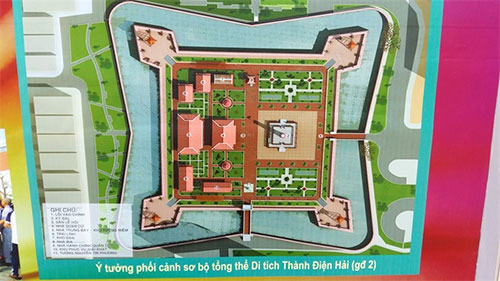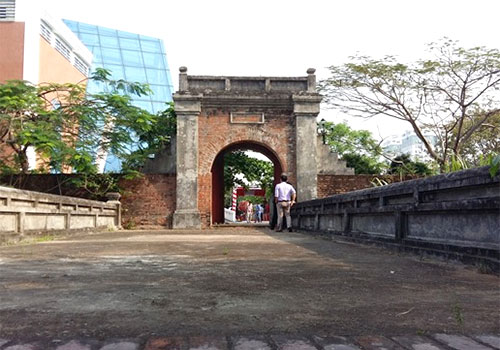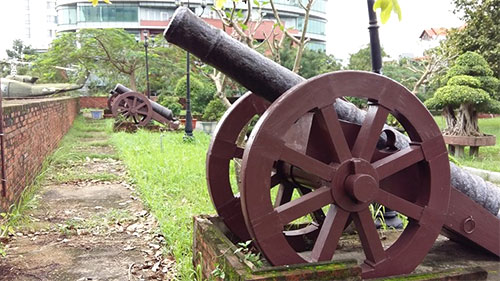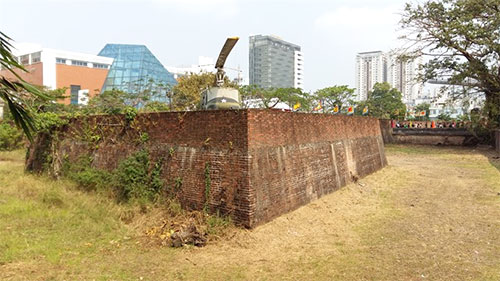The Dien Hai Citadel in the central city was officially recognised as a National Special Relic, under the Prime Minister’s decision signed last year, marking the 160th anniversary of the victory in fighting against French-Spanish coalition forces in 1858-1860.

Minister of Culture, Sports and Tourism Nguyen Ngoc Thien (right)
hands over the certificate of National Special Relic for the Dien Hai Citadel in Da Nang
It’s also the first national special relic recognised among 50 historical sites and 18 national historical monuments in the city.
The Dien Hai citadel, which was listed as a national historical monument in 1988, was first constructed as a military outpost in the 12th year of King Gia Long’s reign (1813), near the mouth of the Han River, to control access to Da Nang Port and serve as an important defensive position.
It was renamed the Dien Hai Citadel in 1835, the 15th year of King Minh Mang’s reign, after it was moved inland and rebuilt on a high mountain in 1823, the fourth year of Minh Mang’s reign.
The city has been seeking a full collection of iron cannons cast during the Nguyen Dynasty between 1802 and 1860 to gain recognition of a National Treasure.

Coming back: A plan for the restoration of the Dien Hai Citadel
The museum of Da Nang still preserves 11 iron cannons that were unearthed at the Dien Hai Citadel between 1979 and 2008.
The cannon collection and citadel are closely linked to Nguyen Tri Phuong (1800-1873), a famous general who commanded an army and civilians in fighting against French-Spanish coalition forces.
The citadel still has a moat between two brick walls and a cannon collection displayed outdoors.
At the recognisation ceremony yesterday, Minister of Culture, Sports and Tourism Nguyen Ngoc Thien asked the city to build up a master plan on the restoration of the citadel in connection with destinations in central Viet Nam in serving for tourism booming.

This way in: An entrance gate of the Dien Hai Citadel
“The citadel was a symbol of Vietnamese indomitable struggles against invaders. The city should restore the citadel as original design since it was built nearly 200 years ago,” Thien said.
“The Dien Hai Citadel will be a favourite destination in central Viet Nam with its magnificent history and culture value among foreign tourists and Vietnamese people.”
Many efforts have been made by the local administration to protect the site from damage and trespassers over past decades.
The museum of Da Nang, which was built on the area of the citadel, with 80 households and buildings, had been removed in preparation for the restoration project.

Bombs away: A cannon set in the front yard of the Dien Hai Citadel
The city also invested to upgrade the national relic grave of Khue Trung in Hoa Vang District which is the resting place of 1,500 warriors and local people who died during the fight against French-Spanish forces.
Da Nang also plans to recognise the graves of the French-Spanish forces killed in 1858-1860 as a relic related to the Dien Hai Citadel.
Vice-chairman of the National Heritage Council, Dang Van Bai, said Dien Hai Citadel should be restored as a historical landmark to attract local and foreign tourists.
He said the citadel may be the last monument in Da Nang that symbolises the sacrifice of Da Nang people and warriors in the fight against the foreign forces.
Director of the city’s Culture and Sports department, Huynh Van Hung said it was a great endeavour to protect the relics that symbolise the history and foundation of Da Nang City.

Still standing: A corner of the interior brick wall of the Dien Hai Citadel. It was built as a military
outpost in the 12th year of King Gia Long’s reign (1813), near the mouth of the Han River
He said the citadel, which is now the site of the city’s museum on Tran Phu Street, had been encroached by public and residential buildings and projects between 1998-2014.
As planned, the restoration project of the Dien Hai Citadel will be built in two stages between 2018-2020 in making it as heart of the city’s cultural square and top destination in the near future.